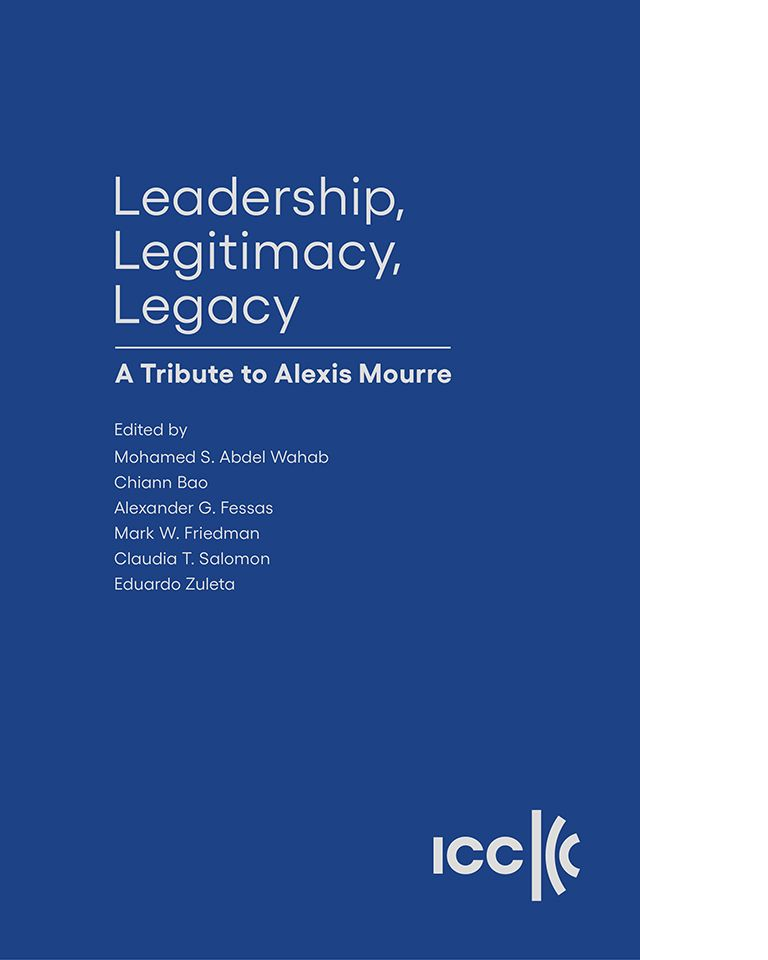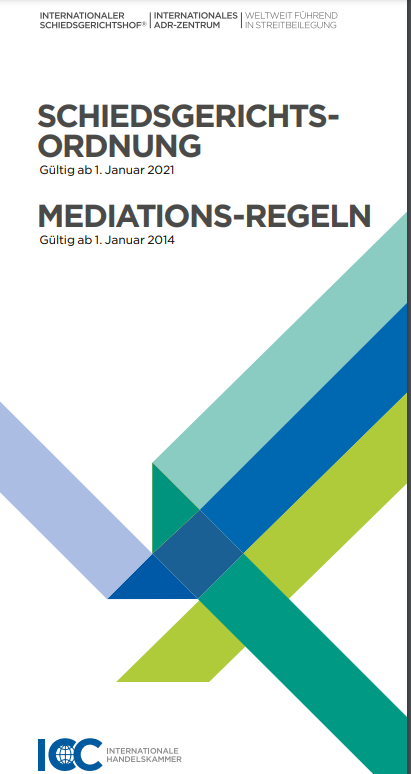€0,00
Euro zzgl. Versandkosten
This booklet contains two discrete but complementary dispute resolution procedures offered by the International Chamber of Commerce (ICC).
Arbitration under the ICC Arbitration Rules is a formal procedure leading to a binding decision from a neutral arbitral tribunal, susceptible to enforcement pursuant to both domestic arbitration laws and international treaties such as the 1958 New York Convention. Mediation under the ICC Mediation Rules is a flexible procedure aimed at achieving a negotiated settlement with the help of a neutral facilitator. The two sets of Rules are published together in this booklet in answer to the growing demand for a holistic approach to dispute resolution techniques.
Each set of Rules defines a structured, institutional framework intended to ensure transparency, efficiency and fairness in the dispute resolution process while allowing parties to exercise their choice over many aspects of procedure. Arbitration is administered by the International Court of Arbitration and mediation by the International Centre for ADR. These are the only bodies empowered to administer proceedings under their respective Rules, thereby affording parties the benefit of the experience, expertise and professionalism of a leading international dispute resolution provider.
Drafted by dispute resolution specialists and users representing a wide range of legal traditions, cultures and professions, these Rules provide a modern framework for the conduct of procedures and respond to the needs of international trade today. At the same time, they remain faithful to the ethos and essential features of ICC dispute resolution and, in particular, its suitability for use in any part of the world in proceedings conducted in any language and subject to any law.
Arbitration
The Arbitration Rules are those of 2012, as amended in 2017 and 2021. They are effective as of 1 January 2021.
Some of the 2021 amendments reflect established practice of the Court while others aim at increasing the flexibility, efficiency and transparency of ICC Arbitrations.
Amendments with regard to complex arbitrations include Article 7(5) (providing for joinder of additional parties after the confirmation or appointment of any arbitrator) and Article 10(b) (allowing consolidation of cases involving different parties where the same arbitration agreements are relied upon).
The new Article 12(9) introduces an additional safeguard for parties’ equality in the constitution of the arbitral tribunal. It provides that the Court may appoint each member of the arbitral tribunal where the method of constitution in the arbitration agreement may pose a risk to the validity of the award.
Independence and impartiality of arbitrators are further addressed with the inclusion of a provision empowering the arbitral tribunal to take any measure necessary to avoid a conflict of interest of an arbitrator arising from a change in party representation (Article 17(2)), and the requirement of party disclosure of third-party funding arrangements (Article 11(7)). In addition, Article 13(6), which applies to investment arbitrations based on a treaty, ensures complete neutrality of the arbitral tribunal by providing that no arbitrator shall have the same nationality of any party to the arbitration.
On the conduct of the proceedings, the 2021 amendments acknowledge the increased use of technology in arbitration, such as the transmission of the Request for Arbitration and Answer by electronic means of communication (Articles 4 and 5) and the possibility for the arbitral tribunal to decide that hearings can be held remotely after consulting the parties (Article 26(1)). Moreover, the Rules introduce a provision on additional awards (Article 36(3)), and, as a further step towards flexibility and efficiency of the proceedings, encourage parties to consider settlement of all or part of their dispute (Appendix IV(h)(i)).
The Rules also provide for increased transparency with regard to the composition and functioning of the Court (Appendices I and II) and the communication of reasons of Court decisions upon request of any party (Appendix II, Article 5).
The expedited procedure (Article 30 and Appendix VI), which is a streamlined procedure with a reduced scale of fees, has proved its efficiency since it was introduced in 2017. The Rules expand its scope of application to disputes with a value not exceeding US$ 3 million for arbitration agreements concluded on or after 1 January 2021. The expedited procedure continues to be available on an opt-in basis for higher-value cases.
Mediation
The Mediation Rules, in force from 2014, reflect modern practice and set clear parameters for the conduct of proceedings, while recognizing and maintaining the need for flexibility. Like the ADR Rules, which they replace, they can be used for conducting other procedures or combinations of procedures that are similarly aimed at an amicable settlement of the dispute, such as conciliation or neutral evaluation.
Parties wishing to have recourse to ICC arbitration, mediation, or both, are encouraged to include an appropriate dispute resolution clause in their agreements. For this purpose, each set of Rules is followed by model clauses, together with guidance on their use and how they may be adjusted to particular needs and circumstances. The recommended clauses include multi-tiered clauses providing for a combination of techniques as well as clauses contemplating a single technique.
Both the Rules and the model clauses are available for use by parties, whether or not members of the ICC. For the convenience of users, they have been translated into several languages and can be downloaded from the ICC website.
Details :
| Author : | International Chamber of Commerce |
| Number of pages : | 104 |
| Publishing date : | 2021-01-01 |
| Language : | English |
| Code ISBN : | 978-92-842-0580-6 |
Table of contents :
Wie setzen sich die Preise bei Auslandslieferungen zusammen?
Für Produkte, die auf https://www.iccgermany.de/shop/ angeboten werden und an Bestimmungsorte innerhalb der Europäischen Union (EU) und Nordirland versandt werden, muss bei Verkäufen an Privatpersonen nach den innerhalb der EU geltenden Gesetzen und den innerhalb der einzelnen Mitgliedsstaaten (Bestimmungsland) variierenden Steuersätzen Umsatzsteuer berechnet werden. Die Höhe der zu berechnenden Umsatzsteuer richtet sich nach verschiedenen Faktoren, wie der Identität des Käufers (Unternehmer oder Privatperson), dem Wohnsitz des Käufers, der Art des gekauften Produktes (z.B. Buch, ebook, …) sowie dem Zielort, an den das Produkt versandt werden soll (Bestimmungsland).
Die Preise auf https://www.iccgermany.de/shop/ sind in Euro ausgewiesen und verstehen sich einschließlich deutscher Umsatzsteuer. Bitte beachten Sie, dass der Endpreis von der tatsächlichen Umsatzsteuer abhängig ist, die für Ihre Bestellung anfällt. Bei Bestellungen von Privatpersonen aus dem EU-Ausland wird die deutsche Umsatzsteuer abgezogen und die für das Bestimmungsland/Kundenland gültige Umsatzsteuer berechnet. Den Endpreis inklusive der für die bestellten Artikel gültigen Umsatzsteuersätze sehen Sie auf der letzten Seite des Bestellvorgangs.

A Tribute to Alexis Mourre.

Die Schiedsgerichtsordnung 2021 und die Mediationsordnung 2014 sind als...
Zur Überprüfung Ihrer Identität haben wir Ihnen eine E-Mail an geschickt.
Bitte klicken Sie auf den Bestätigungslink in der E-Mail, um Ihre Anmeldung abzuschließen.
Ups! Sie sind bereits für den Newsletter registriert.
Sie sehen gerade einen Platzhalterinhalt von Facebook. Um auf den eigentlichen Inhalt zuzugreifen, klicken Sie auf die Schaltfläche unten. Bitte beachten Sie, dass dabei Daten an Drittanbieter weitergegeben werden.
Mehr InformationenSie sehen gerade einen Platzhalterinhalt von Instagram. Um auf den eigentlichen Inhalt zuzugreifen, klicken Sie auf die Schaltfläche unten. Bitte beachten Sie, dass dabei Daten an Drittanbieter weitergegeben werden.
Mehr InformationenSie sehen gerade einen Platzhalterinhalt von X. Um auf den eigentlichen Inhalt zuzugreifen, klicken Sie auf die Schaltfläche unten. Bitte beachten Sie, dass dabei Daten an Drittanbieter weitergegeben werden.
Mehr Informationen